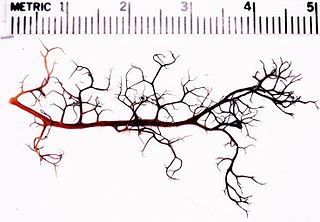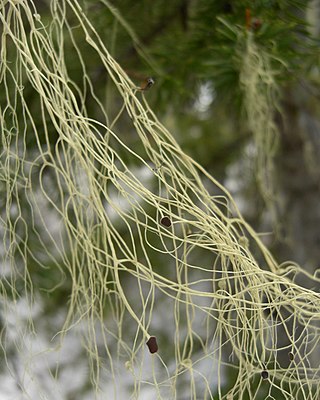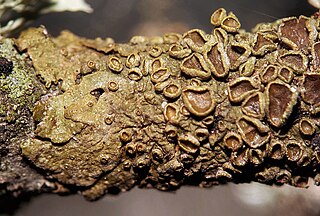
The Parmeliaceae is a large and diverse family of Lecanoromycetes. With over 2700 species in 71 genera, it is the largest family of lichen-forming fungi. The most speciose genera in the family are the well-known groups: Xanthoparmelia, Usnea, Parmotrema, and Hypotrachyna.
Irwin M. Brodo is an emeritus scientist at the Canadian Museum of Nature, in Ottawa, Ontario, Canada. He is an authority on the identification and biology of lichens. Irwin Brodo was honored in 1994 with an Acharius Medal presented to him by the International Association for Lichenology.

Stigmidium is a genus of lichenicolous (lichen-eating) fungi in the family Mycosphaerellaceae. The genus was circumscribed by Italian botanist Vittore Benedetto Antonio Trevisan de Saint-Léon in 1860, with Stigmidium schaereri assigned as the type species.

Muellerella is a genus of lichenicolous lichens in the family Verrucariaceae. The genus has a widespread distribution, especially in northern temperate areas, and contains species that live on other lichens, or on liverworts.

Pseudephebe is a genus of fruticose lichens in the family Parmeliaceae. It contains three species that grow on rocks.

Gyalecta is a genus of lichen-forming fungi in the family Gyalectaceae that contains 50 species. Gyalecta was circumscribed by lichenologist Erik Acharius in 1808.
Arthopyrenia is a genus of fungi within the Arthopyreniaceae family. The genus has a widespread distribution, a cosmopolitan distribution. It formerly contained about 117 species.

Gowardia is a genus of medium-sized, greyish hair lichens in the family Parmeliaceae. It is a circumpolar genus, mainly restricted to arctic-alpine habitats in northern Canada, Europe, and Russia.

Bryoria is a genus of lichenized fungi in the family Parmeliaceae. Many members of this genus are known as horsehair lichens. The genus has a widespread distribution, especially in boreal and cool temperate areas.

Alectoria is a genus of fruticose lichens belonging to the family Parmeliaceae.

Melanohalea subolivacea, commonly known as the brown-eyed camouflage lichen, is a species of foliose lichen in the family Parmeliaceae.
Bryoria implexa is a species of horsehair lichen in the family Parmeliaceae.

Bryoria nadvornikiana, commonly known as the spiny grey horsehair lichen or the blonde horsehair lichen, is a species of horsehair lichen in the family Parmeliaceae.

Pseudephebe minuscula is a species of fruticose lichen in the family Parmeliaceae. In North America, it is known colloquially as coarse rockwool. It has an antitropical distribution.

Sulcaria spiralifera is a species of fruticose lichen in the family Parmeliaceae. It is found in the northwestern United States, where it grows as an epiphyte, hanging from a variety of tree species in open or shaded maritime forests.










